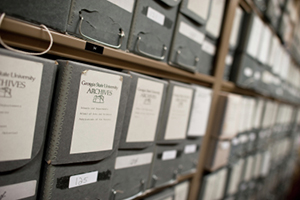Congruence Engine investigations

Datafication and Cultural Heritage collections data infrastructures
Critical Perspectives on documentation, cataloguing and data-sharing in cultural heritage institutions
Short summary
The role of cultural heritage collections within the research ecosystem is rapidly changing: from inactive primary source or reference point for humanities research, cultural heritage collections are now becoming integral part of large scale interdisciplinary inquiries using computational-driven methods and tools. This new status for cultural heritage collections, the ‘collections-as-data’ era, wouldn’t be possible without foundational work that was and is still going on ‘behind the scenes’ in cultural heritage institutions through cataloguing, documentation and curation of cultural heritage records. These processes, and the standards, systems, various subjects and stakeholders that support them, are central - but often less-studied- in the ways cultural heritage collections are becoming computer-readable-, accessible- and reusable-as-data. This investigation will focus on assessing the landscape for cultural heritage collections data infrastructure in the UK through an empirical and critical perspective. It will consist of a two-fold empirical study (survey and interviews) on cultural heritage collections data infrastructure of UK cultural heritage institutions. Through this investigation we will try to map the infrastructure that cultural heritage organisations use to record and manage their collections, exploring the range of systems being used, the levels of complexity or ease at which collections data can be accessed, and the challenges, requirements and opportunities existing cultural heritage collections data infrastructures pose for creative, innovative and impactful collections-as-data future work.
People
Arran Rees
Conceptualization, Methodology, Data curation, Formal analysis, Writing
Daniel Belteki
Conceptualization, Methodology, Data curation, Formal analysis, Writing
Anna-Maria Sichani
Conceptualization, Methodology, Data curation, Formal analysis, Writing
Licence
This work is licensed for permissive re-use under a Creative Commons Attribution 4.0 License - CC BY 4.0.